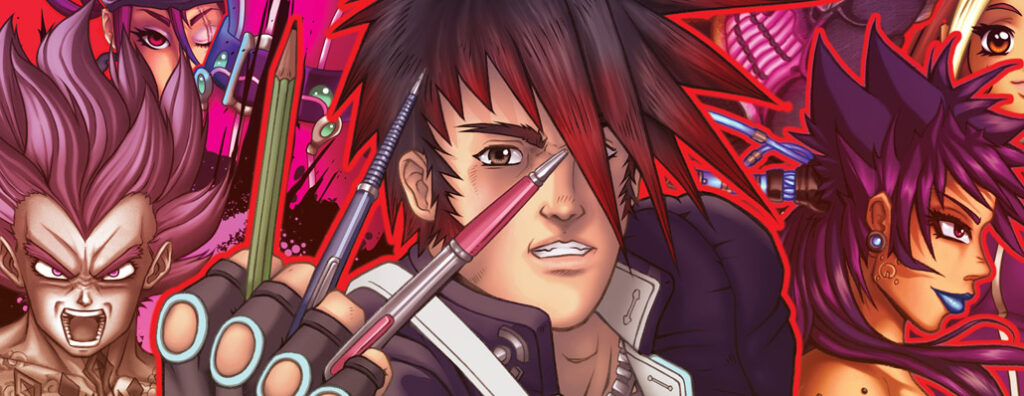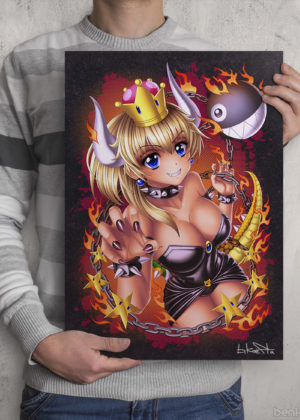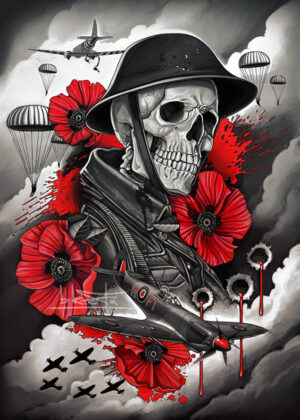MBTI and Art
Much of my life has been spent attempting to understand both myself and the world I inhabit. Part of this journey of discovery involved reading up on Psychology related topics where I'd learnt about the MBTI (Myres-Briggs Type Indicator). It's a test to reveal which 1 of 16 specific personality types you resemble. You can take the test here if you're interested in seeing which type you belong to.
My type? INTJ. I'm a person with the Introverted (I), Intuitive (N), Thinking (T), and Judging (J) personality traits.
"These thoughtful tacticians love perfecting the details of life, applying creativity and rationality to everything they do. Their inner world is often a private, complex one", says 16personalities.com.
Are all INJTs artists? From what I've found, most aren't! INTJs like myself are usually given the label of 'Architect' or 'Strategist'. I should be the type to work as a scientist or analyst, playing chess and reading technical books for fun. While I do enjoy analysing things, playing board games and would often rather read a manual or something more factual than fiction, I also love art and design. Rather 'ISFP' types are often considered to have the artist personality type in the MBTI world.
As a side-note, 'Psychology Junkie' assigned a Myres-Briggs type to a list of famous fine artists with different personalities on their site. It's interesting but may not be completely accurate. It at least highlights the fact that no matter your personality, there's potential for you to become an artist if that's what you want to do.
My Experience and thoughts...
One thing I often felt didn't quite work with the MBTI was determining a person's stress sensitivity. Whether or not an individual is more prone to positive or negative emotions makes a big, noticeable difference in one's life choices, habits and interests. Unlike another personality model- 'The Big 5', stress sensitivity wasn't taken into account with the MBTI. Take the big 5 test here. Although 16personalities.com have added a suffix of T for Turbulent / stress-sensitive types and A for Assertive types to help address this. Although this does now kind of indicate 32 potential personality types and starts to defeat the purpose of pigeonholing in order to make quick generalizations. Suffice to say, MBTI is not the perfect personality model, but is still useful.
The reason I bring this up is because unfortunately for me I'm high up on the negative emotions spectrum. A guy with the 'Turbulent' INTJ variant who's easily stressed and cautious. And so my experience of being an INTJ artist might differ from the next INTJ. I want to discuss my experiences all the same.
[Aside: Having a more cautious personality can have it's advantages. Without going in depth; You'll be less likely to get involved in risky activities or having accidents. It'll make you more aware of and considerate towards the people around you - an otherwise common criticism of the INTJ type. To know stress and negativity so well allows one to fully appreciate positivity when it does arrive.]
Why do you create the things you do?
It's a deep and interesting question.
I would speculate that the type of art you focus on i.e. the theme and style would have some correlation to your Myers-Briggs personality type. Although I'm sure other personality dimensions such as orderliness and agreeableness could be used to more likely determine the theme and style an artist tends to prefer. Our tastes are shaped by both our innate personalities, but also the experiences we've had throughout our lives. Having grown up on 80s cartoons as a kid, then moving to anime into my pre-teens ensured a desire to imitate what I thought was inspiring. Hence I went on to produce and sell a million copies of manga related art books as an adult.
Being an INTJ makes me very forward-thinking
When it comes to creating art, I'm often focused on the end result rather than process. This can be challenging when I have a 50 hour image waiting to be created and I'm not always 'in the moment'. I've often felt agitated or unsatisfied until I'm on the home stretch and working on the last 10-20% of an image.
I want to bring beauty into reality
My philosophy for creating has always been "because it looks cool". A sentiment I share with one of my favoured anime directors Yoshiaki Kawajiri. As well as comic artist Todd McFarlane. I care about the aesthetics more than the deeper meaning behind the image. Every artwork an artist creates will communicate something, but my aim is to convey my own tastes with a literal illustration. Style, technique and subject often takes precedent over producing narrative, mood, something abstract and ambiguous.
Don't get me wrong, I can walk into a modern art gallery and understand what I'm looking at, unlike the laymen who might question "what the hell is this supposed to be?", but I have little interest in producing modern art and hate the pretentious side to it. Ascribing meaning to nothing then giving yourself a pat on the back? Yuck!
I want to create perfection
If an image doesn't look as close to perfect as I'm able to produce, I'm unhappy. I'm bound by the limits of my own competency, so while I know I'll never achieve true perfection, if such a thing exists, at least I'll try to get as close to the best thing I'm capable of. Not that perfectionism is an INTJ specific trait, but there's satisfaction when the plan comes together and everything looks just right.
Expertness is important to me. In general I like to be good at everything I do. Perhaps it's some ego thing whereby I don't want to believe I'm as useless as I actually am? But certainly I'm happier when others can recognise my accomplishments. If art happens to be something I'm being praised for, then I'll continue to do it. But more important to what anyone else thinks, I want to produce work to my own self-imposed, exacting standards.
Best suited art careers for INTJs
INTJs are not the typical, whimsical artist types. INTJs will need to find a way to make certain artistic roles work to suit their needs. I've spent the past two decades dabbling with different artistic jobs and some worked better for me than others. I list these below.
I appreciate no two INTJs are the exactly same, and in fact some won't even understand the point of art! But INJT types like myself are a testament to how it's still possible to pursue and succeed in different disciplines within the field of art and design.
Most art jobs are going to require 1- a lot of time on your own (being an introvert makes this easier) and 2- devoting a lot of time to building competency in your craft. If you happen to be an INJT, or even if you're not, here are some job options within the field of art and design:
Graphic Designer:
Graphic Design roles gives an opportunity to create but with tighter restrictions than working with a blank canvas and paint. For example, you might like the idea of exploring the subtleties of typography and becoming an expert on the use of lettering. It's direct, clean, to the point and serves a purpose. No messy paints required since it's mostly all digital. Freelancing from home might be the way to go if you don't like the idea of mixing with other employees in an office or studio.
Web designer:
Allows for planning how a site should look and function, while coding gives the mathematical and logical circuits of the brain a chance to fire up. There's something quite satisfying about being able to read a page of code as well as design the visuals for an attractive, functional site.
Illustrator:
This can be for books, ads, promo material. I suspect that understanding the rules of art and design and then applying them is the best way to go for an INTJ type. There are rules to art such as composition and colour theory, and once those rules are established, being able to come up with a plan to maximize each design's potential is the way to go. Illustration has a clear goal to communicate something specific up-front. Often the best advertising illustrations are well thought out and witty, giving an INJT like myself an opportunity to make use of that part of my mind.
Concept Artist:
For those who love to create characters or environments for games and films. INTJs may prefer this as it requires becoming a competent technical artist. Non-INTJ artists who are keen to create but have no talent, little skill or patience may instead gravitate towards abstract, modern art or learn to blag their way to a successful art career. You can't blag a your way into a concept artist roll. Of all the artist fields, I would guess Concept art might be one of the hardest art professions to succeed in due to the fact it's so popular and already holds a large pool of highly competent artists.
Tattoo artist:
One of the few art careers these days which will allow for a lot of time away from the screen. You'll be more likely to get praise from customers on a daily basis, which helps facilitate the need for acknowledgment of accomplishments. It means working with people and being social which introverts generally prefer minimizing, although it's primarily 1-1 communication. Having worked part-time as a tattoo artist myself for over 10 years, I can say that the aspect of dealing with customers can be challenging but has helped me grow as a person.
Animator:
Although having worked on a several basic animation projects, I've not professionally worked as an animator for any length of time. It requires technical skills and patience which an INTJ might have a better time dealing with. Although animation takes a long time to reach your future vision and it's often repetitive. Despite being a huge fan of anime, cartoons and animation, I've always been put off by the prospect of needing to devote an entire day or more just to make a character move an arm or walk from one room to other for example.
Manga / Comic Artist:
This requires high level of technical ability. If you can handle lot of time on your own, this will suit you. If you like to write and conceptualise your own stories, this is the career for you. Although most employed comic artists will end up spending much of their time working from another writer's script. Having a successful career as a manga ka (artist) or comic artist is extremely tough. I would imagine the task of conveying different emotions through characters might be a little challenging to INTJs at first also.
Fine Artist:
You'll specialise in a particular medium and concentrate on a particular subject matter and type of art i.e. landscapes, portraits. It allows for a lot of autonomy which is great, but you'll need to work on selling which will be the hardest obstacle for an INTJ as selling will involve interactions with other people either face to face or through online videos. Having the freedom to create whatever you want is the dream of many artists, but for most, monetizing your creations will be extremely difficult.
[Aside: Being an artist is not someone who does modern dance, plays drums or writes poetry. As per what was described in a Reddit thread I was reading while researching this post. All those things are considered creative pursuits, sure, but you're only an artist if you design and create something tangible in 99.9% of cases. There's no criticism towards being a dancer, musician or creative writer, however there's no point over complicating definitions.]
To finish off
While I love art, design and illustration I often wonder; if I were to re-play my life would I have chosen it as a career? It's probably too late to trade up this profession so I shouldn't have regrets. I've been doing it a while and couldn't bare to give up the 20,000 or so hours I've invested in my pursuit of art and design. I suspect that inheriting my dad's traits (a fellow INTJ) while having an artistically minded mum encouraging my creative side would always lead me to where I am now?
I can't feel guilty for my time spent on art. And I'm sure I would engage in it even as a hobby, if not my career. To think of an idea and to then bring it into reality through one's creative endeavours is an amazing thing and a worthwhile goal. No matter your 'type', if you're making or improving something, even through analysis and carefully considered critique then you're on the right track. I would argue, to bring beauty into existence is one of humanities' most important contributions to the universe. What do you think? Are you contributing?


















 RSS – Posts
RSS – Posts
You can get bright and shiny colours with all of those. Although for deep, solid colour I'd choose to go with acrylic paint. Markers can look a little watery and pencil can sometimes look grainy, depending on the type of pencils and paper you use. Paint definitely takes the most practice. With paint it's more a case of working with larger brushes and areas before focusing on and refining details. Where as markers are more consistent, whereby you'd more likely finish a smaller area of the artwork at a time before moving on to the next area. Perhaps I'll create some basic tutorials on these if there's enough interest :)
Do I need a Drawing Glove for my Digital Art?